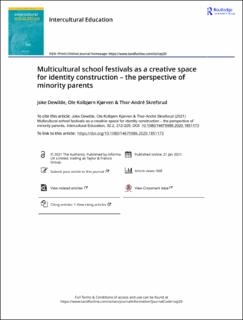| dc.contributor.author | Dewilde, Joke | |
| dc.contributor.author | Kjørven, Ole Kolbjørn | |
| dc.contributor.author | Skrefsrud, Thor Andre | |
| dc.date.accessioned | 2021-09-15T11:25:51Z | |
| dc.date.available | 2021-09-15T11:25:51Z | |
| dc.date.created | 2019-09-13T20:25:02Z | |
| dc.date.issued | 2021 | |
| dc.identifier.citation | Intercultural Education. 2021, 32 (2), 212-229. | en_US |
| dc.identifier.issn | 1467-5986 | |
| dc.identifier.uri | https://hdl.handle.net/11250/2777400 | |
| dc.description | © 2021 The Author(s). Published by Informa UK Limited, trading as Taylor & Francis Group. This is an Open Access article distributed under the terms of the Creative Commons Attribution-NonCommercial-NoDerivatives License (http://creativecommons.org/licenses/by-nc-nd/4.0/), which permits non-commercial re-use, distribution, and reproduction in any medium, provided the original work is properly cited, and is not altered, transformed, or built upon in any way | en_US |
| dc.description.abstract | In this article, we explore how minority parents construct and promote cultural identities through a multicultural school event in Norway. Such events respond to the call for diverse and inclusive initiatives to facilitate learning, belonging, and cohesion in schools. Interestingly, while schools see these events as helping further inclusion, prior research on the subject has criticized such events for promoting essentialist understandings of cultural identities, hence regarding them as counterproductive to the aim of promoting inclusion. This research has directed scarce attention to the participant perspective, among them minority parents. Using the stall of the Kurdish parents as an example, we conducted fieldwork applying the method of Linguistic Landscaping. In addition, we conducted semi-structured interviews with the parents asking questions about the festival and the meaning of the displayed representations in their stall. The findings indicate that the Kurdish parents involved view the event as an important space for creative construction of transnational and diasporic identities, as well as an opportunity for a minority group to strive for acceptance for its cause. We end the article by reflecting on the pedagogical potential in multicultural school events as tools for creating inclusive school practices. | en_US |
| dc.language.iso | eng | en_US |
| dc.relation.uri | https://brage.inn.no/inn-xmlui/handle/11250/2649746 | |
| dc.rights | Attribution-NonCommercial-NoDerivatives 4.0 Internasjonal | * |
| dc.rights.uri | http://creativecommons.org/licenses/by-nc-nd/4.0/deed.no | * |
| dc.subject | multicultural school festivals | en_US |
| dc.subject | minority parents | en_US |
| dc.subject | diasporic identity | en_US |
| dc.subject | transnationalism | en_US |
| dc.title | Multicultural school festivals as a creative space for identity construction – the perspective of minority parents | en_US |
| dc.type | Peer reviewed | en_US |
| dc.type | Journal article | en_US |
| dc.description.version | publishedVersion | en_US |
| dc.subject.nsi | VDP::Samfunnsvitenskap: 200::Pedagogiske fag: 280 | en_US |
| dc.source.pagenumber | 212-229 | en_US |
| dc.source.volume | 32 | en_US |
| dc.source.journal | Intercultural Education | en_US |
| dc.source.issue | 2 | en_US |
| dc.identifier.doi | 10.1080/14675986.2020.1851173 | |
| dc.identifier.cristin | 1724629 | |
| cristin.ispublished | true | |
| cristin.fulltext | postprint | |
| cristin.fulltext | original | |
| cristin.qualitycode | 2 | |

